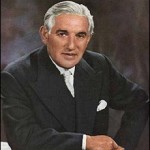Zev Wolfson (1928-2012) was born in Lithuania, deported to Siberia during World War II and finally made his way to New York. With no money he began working as a light-bulb salesman, but soon found his way into real estate where he quickly earned a large sum of wealth. Inspired by the sight of an Israeli flag, Wolfson began working tirelessly for Israel, lobbying the U.S. government to help the nascent state. He secured arms for Israel during the critical period of the Yom Kippur War, and built countless institutions across the country. Yitzchak Rabin said he didn’t know “one other Jew in the world who, as an individual, had done more for the State of Israel”. In spiritual matters, too, Wolfson was a giant, financing yeshivas worldwide, and paying for such programs as RAJE, Aish Fellowships, and Argentina’s Morasha, which bring thousands of young Jews to Israel every year at virtually no cost. Possibly every Jew in the world has somehow been touched by Wolfson’s outreach – he even established a Torah-learning program in Iran during the times of the Shah! Humble and dedicated to Torah, he made sure to donate more than 50% of his earnings, and was known to fly economy class despite his wealth. His family continues to contribute hundreds of millions of dollars to Jewish causes every year.

Sir Isaac Wolfson
Zev Wolfson is not to be confused with Sir Isaac Wolfson (1897-1991) of Scotland, another great Jewish philanthropist. Born to poor Polish immigrants, Isaac Wolfson couldn’t afford school so he became a salesperson. He worked his way up to become director of Great Universal Stores, once among the largest retailers in the UK, with over 50,000 employees. A devout Orthodox Jew, Sir Wolfson donated virtually all of his wealth, much of it to build the young State of Israel, saying “No man should have more than £100,000. The rest should go to charity.”
Words of the Week
People are accustomed to look at the heavens and wonder what happens there. It would be better if they would look within themselves to see what happens there.
– Menachem Mendel of Kotzk, “The Kotzker Rebbe”

